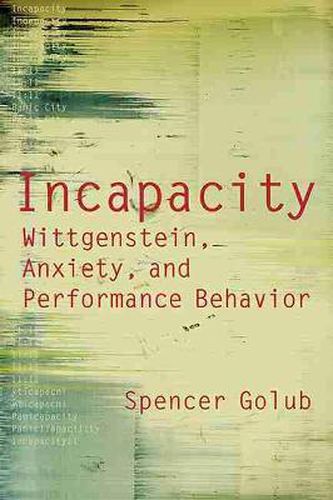Readings Newsletter
Become a Readings Member to make your shopping experience even easier.
Sign in or sign up for free!
You’re not far away from qualifying for FREE standard shipping within Australia
You’ve qualified for FREE standard shipping within Australia
The cart is loading…






In this highly original study of the nature of performance, Spencer Golub uses the insights of Ludwig Wittgenstein into the way language works to analyse the relationship between the linguistic and the visual in the work of a broad range of dramatists, novelists, and filmmakers, among them Richard Foreman, Mac Wellman, Peter Handke, David Mamet, and Alfred Hitchcock. Like Wittgenstein, these artists are concerned with the limits of language’s representational capacity. For Golub, it is these limits that give Wittgenstein’s thought a further, very personal significance its therapeutic quality with respect to the Obsessive Compulsive Disorder from which he suffers. Underlying what Golub calls performance behaviour is Wittgenstein’s notion of pain behaviour that which gives public expression to private experience. Golub charts new directions for exploring the relationship between theatre and philosophy, and even for scholarly criticism itself.
$9.00 standard shipping within Australia
FREE standard shipping within Australia for orders over $100.00
Express & International shipping calculated at checkout
In this highly original study of the nature of performance, Spencer Golub uses the insights of Ludwig Wittgenstein into the way language works to analyse the relationship between the linguistic and the visual in the work of a broad range of dramatists, novelists, and filmmakers, among them Richard Foreman, Mac Wellman, Peter Handke, David Mamet, and Alfred Hitchcock. Like Wittgenstein, these artists are concerned with the limits of language’s representational capacity. For Golub, it is these limits that give Wittgenstein’s thought a further, very personal significance its therapeutic quality with respect to the Obsessive Compulsive Disorder from which he suffers. Underlying what Golub calls performance behaviour is Wittgenstein’s notion of pain behaviour that which gives public expression to private experience. Golub charts new directions for exploring the relationship between theatre and philosophy, and even for scholarly criticism itself.